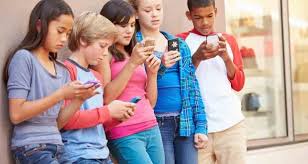
Phones imperil kids' eyes Mobile screens worse than tv, says study
G.S. Mudur, TT, Dec 21, 2017, New Delhi: Schoolchildren who spend seven hours or more a week gazing into computers or mobile phone screens appear to be at highest risk of worsening myopia, India's largest study to progressively track children's eyesight has suggested.
The study by ophthalmologists at the All India Institute of Medical Sciences (AIIMS), New Delhi, has found that six hours or more per day of reading or writing or four hours or more per week on computer or mobile screens increased the risk of myopia.
The doctors say their study, just published in the journal PLOS One, underscores the need for guidelines for regular screening of children's eyesight and advisories to protect children's eye health. Their findings also suggest that watching TV up to 15 to 21 hours a week does not increase the risk of myopia.
The study has observed a protective effect of outdoor activity. Children who spent two hours or more per day outdoors had a significantly lower risk of myopia progressing. Among the 629 children whose myopia had progressed, 580 spent less than two hours a day outside.
The doctors say the protective effect of outdoors and the lower risk of TV compared to computers or video games are not surprising. "The human eyes are made for distance viewing - that is the restful state of the eyes," said Rohit Saxena, professor of ophthalmology at the Rajendra Prasad Institute of Ophthalmic Sciences at AIIMS, who led the study. "When you fix a gaze on a computer or a handheld screen, the eyes have to do more work."
Similarly, watching a television screen from a distance demands less work from the eyes than gazing into a computer or mobile screen.
Saxena and his colleagues examined the eyesight of more than 9,600 children between the ages of five and 15 years drawn from 20 schools across the capital - first to generate baseline figures for incidence of myopia and then toexamine the same children again to track progression of myopia if any.
"Multiple factors influence the risk of myopia - our study was designed to separate and quantify the risk from different factors," Saxena said. The Union science and technology ministry funded the study.
Among 1,297 children who had been diagnosed with myopia during the first round of examinations, 629 (nearly 49 per cent) displayed an increase in myopia after a year.
Children who spent seven hours or more per week on computers or mobile video games were three times at greater risk for progressive myopia than children who had not. Similarly, children who spent 42 hours or more per week reading or writing were twice at risk of their myopia progressing to a higher level.
"We see a clear dose-dependent relationship - the greater the exposure, the higher the risk," Saxena said. Other members of the research team were senior ophthalmologists Praveen Vashist, Radhika Tandon, Amit Bharadwaj, and Vimala Menon and biostatistician Ravindra Pandey.
The AIIMS researchers have recommended that school screening of eyesight - typically conducted according to availability of resources - should be conducted every year. The researchers say this is particularly important because changes in urban lifestyles, the perceived importance of competitive education and excelling in exams, and proliferation of handheld devices for entertainment could increase the risk of myopia.The other team members were senior ophthalmologists Radhika Tandon and Vimala Menon, community ophthalmologist Praveen Vashist, the head of biostatistics Ravindra Pandey and staff member Amit Bharadwaj.

0 Response to "Phones imperil kids' eyes Mobile screens worse than tv, says study"
Post a Comment
Kalimpong News is a non-profit online News of Kalimpong Press Club managed by KalimNews.
Please be decent while commenting and register yourself with your email id.
Note: only a member of this blog may post a comment.